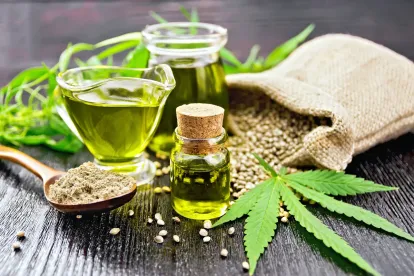-
Delta-8 tetrahydrocannabinol (Delta-8 THC), as found in many popular products, is a compound that can be made by chemical conversion of cannabidiol (CBD) extracted from hemp. Delta-8 THC is an isomer of Delta-9 THC and has similar psychoactive and intoxicating effects. Both THC isomers are found at very low levels in “hemp” (as defined in the 2018 Farm Bill). There was very little regulatory focus on Delta-8 THC until an array of new products, including gummies, brownies, and cookies, began popping up on-line and in gas stations, convenience stores and other retail outlets in late 2020.
-
A September 14, 2021 consumer update from the Food and Drug Administration (FDA), titled “5 Things to Know about Delta-8 Tetrahydrocannabinol – Delta-8 THC,” was issued in reaction to multiple factors, including an uptick in adverse event reports, finding Delta-8 THC products marketed to children, and contamination concerns from potentially unsafe manufacturing methods. FDA’s public notification covers five things to know about Delta-8 THC products as follows:
-
Delta-8 THC products have not been evaluated or approved by FDA for safe use and may be marketed in ways that put public health at risk, including variable Delta-8 THC concentrations, non-standardized formulations, misleading labeling, other cannabinoid and terpene content, and unauthorized claims for therapeutic or medical use.
-
FDA has received adverse event reports involving 22 patients who experienced vomiting, hallucinations, trouble standing, and/or loss of consciousness following the ingestion of Delta-8 THC products, with 19 such patients having consumed food products containing Delta-8 THC. National poison control centers have reported 661 exposure cases of Delta-8 THC, with 660 occurring between January 1, 2021 and July 31, 2021, and 39% involving mostly unintentional exposures in pediatric patients less than 18 years of age.
-
Delta-8 THC has psychoactive and intoxicating effects, similar to Delta-9 THC, the component responsible for the “high” that may be experienced from using cannabis. FDA is also concerned that Delta-8 THC products likely expose consumers to much higher levels of the substance than are naturally occurring in hemp cannabis raw extracts or from the historical use of cannabis.
-
Because of the very low concentration of Delta-8 THC naturally present in hemp, manufacturing Delta-8 THC products often involves the use of potentially harmful chemicals to synthetically convert CBD, derived from hemp, into Delta-8 THC. In addition to such chemicals presenting manufacturing hazards, or possibly remaining at unsafe levels as contaminants in finished Delta-8 THC products, ubiquitous amateur production methods result in uncertainty with respect to other potential contaminants that may be present or produced depending on the composition of the starting raw material and by-products created during synthesis. Unsanitary manufacturing conditions may also lead to safety concerns for some Delta-8 THC products.
-
Delta-8 THC products should be kept out of the reach of children and pets. Many Delta-8 THC products are packaged and labeled in ways that may appeal to children and are sold by retailers that may not impose age restrictions for purchasing the products.
FDA reports that it is actively working with federal and state partners to further address the concerns related to Delta-8 THC products and is monitoring the market for product complaints, adverse events, and other emerging cannabis-derived products of potential concern.



 />i
/>i

